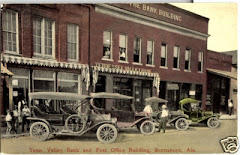"The commercialization of nuclear weapons Plutonium as a fuel for commercial nuclear reactors is compounded insanity." Garry Morgan
Huntsville Times Op-Ed about using Plutonium MOX Fuel at TVA's Browns Ferry Nuclear Reactors
Mixed Oxide Plutonium Fuel (MOX) is composed of uranium dioxide and plutonium dioxide powders which are mixed inside of fuel pellets. Because plutonium releases more radioactivity than uranium, this mixed fuel is more difficult to control inside of reactors and requires more safeguards than traditional uranium reactor fuel. In 2008 MOX fuel rods being tested by Duke Energy started warping and Duke withdrew from the Nuclear Regulatory Commission’s testing agreement.
The additional risks posed by MOX plutonium fuel, along with renewed global skepticism about nuclear power in the wake of the Fukushima disaster, have resulted in the world-wide decline of the MOX industry. Japan has cancelled all of its orders for MOX plutonium fuel and the UK has recently closed its MOX plant in Sellafield due to a lack of customers. With no willing customers, the Department of Energy is pressuring the Tennessee Valley Authority (TVA) to use MOX plutonium fuel. Some of the reactors that TVA is considering for MOX have the same Mark I exploding design that failed in Fukushima. http://www.ananuclear.org/Issues/PlutoniumFuelMOX/tabid/75/Default.aspx
MOX or not? Gov't likes weapons fuel, public doesn't [The Decatur Daily, Ala.] Sept. 14--The Energy Department believes it is safe to use weapons-grade fuel at Browns Ferry Nuclear Plant, but not many residents attending a public hearing Thursday agreed. http://www.equities.com/news/headline-story?dt=2012-09-14&val=479809&cat=energyYou Tube-Calhoun College, Near Browns Ferry, Alabama, DOE-NEPA Plutonium MOX Hearing
Chattanooga meeting on MOX fuel draws a crowd - More than 100 people crowded a room at the Chattanooga Convention Center on Tuesday to talk about using a largely untried fuel in local nuclear reactors to help keep plutonium out of the hands of terrorists. http://www.timesfreepress.com/news/2012/sep/12/chattanooga-meeting-on-mox-fuel-draws-a-crowd/
Why is Plutonium MOX Fuel a bad idea?
--Plutonium fuel weakens the reactor pressure vessel due to embrittlement of the metal in the primary containment as a result of a high neutron flux. http://www.nirs.org/factsheets/basicmoxinfo.htm and http://www-pub.iaea.org/books/iaeabooks/1264/Neutron-Irradiation-Embrittlement-of-Reactor-Pressure-Vessel-Steels
--The use of Plutonium as a commercial nuclear reactor fuel increases the risk of theft and diversion of nuclear materials. The threat of terrorism and nuclear weapons proliferation is greatly increased. http://www.nci.org/b/berlin.htm & http://www.psr.org/nuclear-bailout/resources/nuclear-power-in-france-setting.pdf
--Plutonium reactor fuel can be utilized to fabricate a nuclear weapon. http://www.fas.org/rlg/980826-pu.htm
--Utilization of Plutonium as a commercial nuclear reactor fuel serves one purpose, the financial benefit of the commercial nuclear power industry. Tax payers are paying for the construction of the Plutonium-MOX fuel facilities to benefit the nuclear power industry. Total end costs are estimated at 16 billion dollars for the Savanah River Site (SRS) MOX Plant. President Obama promised $85 billion for “Complex Modernization” in late 2010. http://www.ananuclear.org/Issues/NuclearWeapons/tabid/68/articleType/ArticleView/articleId/587/Default.aspx
-- The use of Plutonium fuel at Browns Ferry, Alabama or Sequoya, Tennessee compounds the insanity of utilizing this dangerous high risk nuclear fuel. Both reactors are old, and in the case of Browns Ferry the reactors are the defective GE Mark 1 reactors which are under increased scrutiny by the Nuclear Regulatory Commission. The nuclear reactors at Fukushima which exploded and “melted down” are the GE Mark 1 series of reactors.
--Weapons Grade Plutonium Mixed Oxide Fuel is high risk and has failed in previous testing at civilian nuclear power reactors. http://www.ucsusa.org/news/press_release/nuclear-fuel-test-failure0140.html
--The use of ex-warhead Plutonium imposes a significant increased health risk to the public if an accident occurs. http://www.princeton.edu/sgs/publications/sgs/pdf/9_1lyman.pdf
SOLUTIONS
The Solution as National Policy: "Two separate initiatives should be developed for dealing with military and civilian Plutonium, to proceed on separate tracks but eventually be brought together into a unified international regime. On the military track, the U.S. should move assertively to strike a deal with the Russians to pursue vitrification in a joint venture underwritten by the United States. The U.S. should make clear that no U.S. funds will be made available for using plutonium in reactors or for reprocessing spent fuel. Instead, a reciprocal approach to joint construction, operation and inspection of vitrification plants in Russia and the U.S. should be proposed." http://www.nci.org/b/berlin.htm (NCI-Nuclear Control Institute)
There is a solution which is recommended for all Plutonium waste materials as indicated in the National Nuclear Security Administration (NNSA) Draft Environmental Impact Statement (EIS) regarding Plutonium weapons material and waste. Glass vitrification of all Plutonium weapons materials and wastes as indicated in appendix G, page G-1 of the NNSA’s July 2012 Draft Supplemental Environmental Impact Statement. http:www.tva.com/environment/reports/mixed_oxide/vol2/AppendixG.pdf
Short video version of above Plutonium MOX Hearing
Short video version of above Plutonium MOX Hearing
Information from the NNSA on Plutonium and Plutonium MOX
Plutonium Disposition: Weapons-grade plutonium and highly enriched uranium (HEU) are the critical ingredients for making a nuclear weapon. With the end of the Cold War, hundreds of tons of these materials were determined to be surplus to U.S. and Russian defense needs. http://www.nnsa.energy.gov/aboutus/ourprograms/nonproliferation/programoffices/fissilematerialsdisposition/plutoniumdispositio
Plutonium Inventory: 34 tons are reported as surplus weapons materials. Total inventory may be found at http://www.nnsa.energy.gov/mediaroom/pressreleases/puinventory62912
The 34 tons:
The Shaw Areva MOX Fuel Fabrication Facility (SHAMS)
















No comments:
Post a Comment